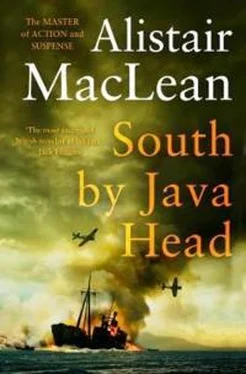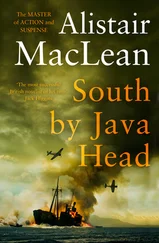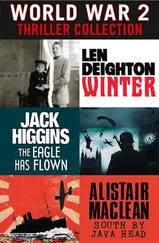Every now and then, when he came to a clear stretch of street, he stepped to one side and let his men file slowly past him. It was doubtful whether any of them as much as saw him, either the very ill men on the stretchers, or the less ill but still sick and wounded men who carried them. And every time Corporal Fraser would have to wait for the last of the party, a tall thin youngster whose head swayed loosely from side to side as he muttered to himself continuously in a rambling and incoherent voice. The young soldier suffered from neither malaria nor dysentery, nor had he been wounded in any way, but he was the sickest of them all. Every time Fraser would seize his arm and hustle him on to catch up with the main party, the boy quickened his pace without protesting, just looked at Corporal Fraser out of incurious eyes that were empty of all recognition: and every time Fraser would look at him hesitantly, shake his head then hurry forwards again until he reached the head of the column.
In a winding, smoke-filled alley, a little boy cried in the darkness. He was only a very little boy, perhaps two and a half years old. He had blue eyes, blond hair and a fair skin all streaked with dirt and tears. He was clad only in a thin shirt and khaki-coloured haltered shorts: his feet were bare, and he was shivering all the time.
He cried and cried, a lost, anguished wailing in the night, but there was no one there to hear or heed. And no one could have heard him who was more than a few yards away, for he cried very softly, short muffled sobs punctuated by long, quivering indrawn breaths. From time to time he rubbed his eyes with the knuckles of small and grubby fists, as little children will when they are tired or weeping: and with the backs of his hands he tried to rub the pain away, from the black smoke constantly laced a smarting path across the tear-filled eyes.
The little boy cried because he was very, very tired, and it was hours past his normal bedtime. He cried because he was hungry and thirsty and shaking with the cold – even a tropical night can be cold. He cried because he was confused and afraid, because he did not know where his home was or where his mother was – he had been with his old amah , his Malayan nurse, at a nearby bazaar a fortnight previously and had been too young and unknowing to appreciate the significance of the bombed and burnt-out rubble that awaited their return – and he and his mother had been due to sail out on the Wakefield , the last big ship from Singapore, on the same night of that 29th January… But he cried, most of all, because he was alone.
His old nurse, Anna, was half-sitting, half-lying on a pile of rubble beside him, like one lost in sleep. She had been wandering with him for hours through the darkened streets, carrying him in her arms for the last hour or two, when she had suddenly placed him on the ground, clasped both hands above her heart and sunk to the ground, saying that she must rest. For half an hour now she had been there, motionless, her head resting far over on one shoulder, her eyes wide and unblinking. Once or twice, earlier, the little boy had stooped to touch her, but only once or twice: now he kept away, afraid, afraid to look and afraid to touch, vaguely knowing, without knowing why, that the old nurse’s rest would be for a long, long time.
He was afraid to go and afraid to stay, and then he stole another glance, through latticed fingers, at the old woman and he was suddenly more afraid to stay than go. He moved off down the alley, not looking where he was going, stumbling and falling over loose bricks and stones, picking himself up and running on again, all the time sobbing and shivering in the cool night. Near the end of the alley a tall, emaciated figure wearing a tattered straw hat eased himself off the shafts of his rickshaw and reached out to stop the child. The man meant no harm.
A sick man himself – most of the consumption-ridden rickshaw coolies of Singapore usually died after five years – he could still feel pity for others, especially little children. But all the little boy saw was a tall menacing figure reaching down out of the gloom: his fear changed to terror, he eluded the outstretched hands and ran out through the mouth of the alley into the deserted street and the darkness beyond. The man made no further movement, just wrapped his night blanket more tightly around himself and leaned back again against the shafts of his rickshaw.
Like the little boy, two of the nurses were sobbing quietly as they stumbled along. They were passing by the only building still burning in the business quarter of the town, and they kept their heads averted from the flames, but even so it was possible to see the smooth broad-boned faces and upcurving eyes of their lowered faces. Both were Chinese, people who do not lightly give way to emotion: but both were very young, and both had been sitting very close to the explosion when the shell had blown their Red Cross truck into the ditch near the southern exit of the Bukit Timor road. They were badly shocked, and still very sick and dazed.
Two of the others were Malays. One was young, as young as the two Chinese nurses, and the other was well past middle age. The young one’s great, sooty eyes were wide with fear, and she kept glancing nervously over her shoulder as they hurried along. The face of the elderly one was a mask of almost complete indifference. From time to time she tried to protest at the speed with which they were being hurried along, but she was incapable of making herself understood: she, too, had been sitting very close to the blast of the explosion, and the shock had blocked her speech centres, probably only temporarily, although it was too soon to say yet. Once or twice she reached up a hand to try to stop the nurse in the lead, the one who was setting the pace, but the other just removed her hand, gently but firmly enough, and hurried on again.
The fifth nurse, the one in the lead, was tall, slender and in her middle twenties.
She had lost her cap when the explosion had blown her over the tail-board of the truck, and the thick, blue-black hair kept falling down over her eyes. From time to time she swept it back with an impatient gesture, and it was then that one could see that she was neither Malayan nor Chinese – not with those startlingly blue eyes. Eurasian, perhaps, but still definitely not European. In the flickering yellow light it was impossible to see her complexion, the colour of her skin, which was streaked with mud and dust anyway. Even under the caked dust, it was possible to see some kind of long scratch on her left cheek.
She was the leader of the party and she was lost. She knew Singapore, and knew it well, but in the enveloping smoke and darkness she was a stranger lost in a strange city. Somewhere down there on the waterfront, she had been told, there was a party of soldiers, many of whom urgently required attention – and if they didn’t get it that night, they would most certainly never get it inside a Japanese prison camp. But with every minute that passed, it looked more and more as if the Japanese would get to them first. The more they twisted and turned through the deserted streets, the more hopelessly lost she became. Somewhere opposite Cape Ru on the Kallang creek she might expect to find them, she had been told: but, as it was, she couldn’t even find the waterfront, far less have any idea where Cape Ru lay in the darkness.
Half an hour passed, an hour, and even her own steps began to flag as despair touched her for the first time. They could never find the soldiers, never, not in this endless confusion and darkness. It was desperately unfair of their doctor, Major Blackley, to have expected it of them. And even with the thought the girl knew that it was not Blackley who was unfair but herself: when dawn came on the outskirts of Singapore, the life of neither man nor woman would be worth a moment’s purchase – it all depended on what kind of mood the Japanese had been in: she had met them before and had bitter cause to remember the meeting, and scars that would bear witness of that meeting, for the rest of her life. The further away from the Jap’s immediate blood-lust the better: besides, as the Major had pointed out, none of them was in a fit state to remain any longer where they were. Unknowingly, almost, the girl shook her head, quickened her pace again and turned off down another dark and empty street.
Читать дальше
Конец ознакомительного отрывка
Купить книгу










